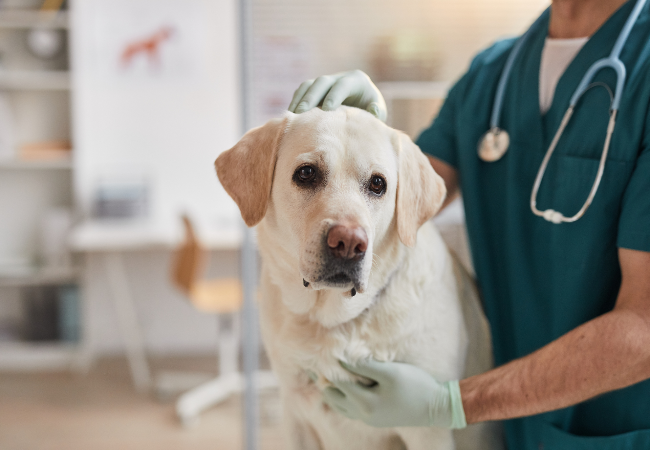Veterinary Guide to Canine Kennel Cough 2025 🐶

In this article
Veterinary Guide to Canine Kennel Cough 2025 🐶
By Dr. Duncan Houston BVSc
🧬 What Is Kennel Cough?
“Kennel cough” (also called canine infectious tracheobronchitis or CIRDC) is a highly contagious upper respiratory syndrome involving inflammation of the trachea and bronchi. Most cases are mild and self-limiting, but serious infections or pneumonia may occur.
🔬 Causes
- Bordetella bronchiseptica – the most common bacterium.
- Viruses: parainfluenza, adenovirus-2, influenza, distemper, coronavirus.
- Other bacteria: Mycoplasma, Pseudomonas, and E. coli may co-infect.
👥 How It Spreads
Transmitted via aerosol droplets, direct contact, or shared items like bowls, toys, and leashes. Puppies, senior dogs, and those in group settings (kennels, dog parks) are high-risk.
⚠️ Clinical Signs
- A dry, persistent “honking” cough, often triggered by excitement, leash strain, drinking, or tracheal palpation.
- Occasional retching or gagging after coughing.
- Mild nasal or eye discharge, sneezing.
- Fever, lethargy, loss of appetite—suggestive of pneumonia.
- Severe forms (e.g., distemper involvement) may involve GI or neurologic signs.
🔍 Diagnosis
- History & exam: Onset after exposure, classic cough.
- Auscultation: Evaluate lung sounds.
- Imaging: Chest X-ray if pneumonia is suspected.
- Lab tests: Only if severe or nonresponsive—PCR of swabs, culture.
🏠 Home Management
- Encourage rest and avoid exertion.
- Humidify the air with steam or a vaporiser.
- Provide warm, enticing meals; ensure hydration.
- Isolate from other dogs to prevent the spread.
💊 Veterinary Treatment
- Mild cases: May resolve in 7–14 days without meds.
- Symptom relief: NSAIDs for inflammation, antitussives like hydrocodone for persistent cough.
- Antibiotics: Only if bacterial pneumonia or prolonged signs (e.g., doxycycline, amoxicillin-clav).
- Hospitalization: For oxygen, IV fluids in severe pneumonia.
📈 Prognosis
- Good in mild cases—recovery in 1–2 weeks.
- Pneumonia or distemper-related cases require intensive care; puppies and older dogs have a higher risk.
🛡 Prevention
- Vaccination: Core vaccines (parainfluenza, adenovirus, distemper), Bordetella intranasal/IM annually or every 6 months for at-risk dogs.
- Hygiene: Disinfection of bowls, toys; avoid crowded dog settings during outbreaks.
- Quarantine: Isolate new or symptomatic dogs for 2–3 weeks.
📱 Ask A Vet Telehealth Support
- 📸 Upload videos of your dog’s cough to help assess severity remotely.
- 🔔 Get reminders for medications, rest periods, and rechecks.
- 🩺 Video consults to advise on home care and breathing support.
🎓 Case Spotlight: “Buddy” the Boarding Pup
Buddy, a 2-year-old Labrador, developed a honking cough 5 days after kennel boarding. Examination showed no pneumonia. At-home care with steam therapy, NSAIDs, and isolation led to full recovery in 10 days. Ask A Vet helped schedule meds, check-ins after 3 and 7 days, and arranged humidifier delivery. Buddy returned happy and healthy. 🐶💨
🔚 Key Takeaways
- Kennel cough is a contagious, sometimes mild respiratory syndrome, but it may progress in high-risk dogs.
- Characteristic honking cough with occasional gagging; milder cases don’t require antibiotics.
- Diagnosis based on history and exam; imaging or lab tests if severe.
- Supportive care with rest, humidification, NSAIDs, and cough suppressants is usually sufficient.
- Vaccination, hygiene, and isolation help prevent outbreaks.
- Ask A Vet telehealth supports remote assessment, care guidance, medication delivery, and preventative advice 📲🐾
Dr Duncan Houston BVSc, founder of Ask A Vet. Download the Ask A Vet app to support your dog’s respiratory health—from early remote triage and home remedies to medication coordination and outbreak prevention 🐶📲






